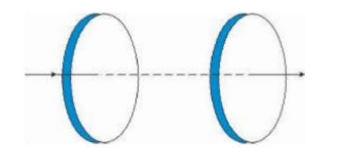Answer carefully: Guess a possible reason why water has a much greater dielectric constant (= 80) than say, mica (= 6).Solution in Punjabi
Step by step video & image solution for Answer carefully: Guess a possible reason why water has a much greater dielectric constant (= 80) than say, mica (= 6). by Physics experts to help you in doubts & scoring excellent marks in Class 12 exams.
Topper's Solved these Questions
Similar Questions
Figure 8.6 shows a capacitor made of two circular plates each of radius 12 cm, and separated by 5.0 cm. The capacitor is being charged by an external source (not shown in the figure). The charging current is constant and equal to 0.15A. Calculate the capacitance and the rate of change of potential difference between the plates. :
 01:48View Solution
01:48View SolutionAnswer the following questions regarding earth’s magnetism:A vector needs three quantities for Its specification. Name the three Independent quantities conventionally used to specify the earth’s magnetic field.
03:29View Solutionसावधानीपूर्वक उत्तर दीजिए
एक संभावित उत्तर की कल्पना कीजिए की पानी का परावैद्युतांक (=80) , अभ्र्क के परावैद्युतांक ( = 6 ) से अधिक क्यों होता है ?01:37View SolutionGuess a possible reason why water has a much greater dielectric constant (=80) than say, mica(=6).
02:11View Solutionएक संभावित उत्तर की कल्पना कीजिए कि पानी का परावेद्युतांक (=80) अभ्रक के परावैद्युतांक (=6) से अधिक क्यों होता है?
View SolutionWhat is meant by the statement that the dielectric constant of water is 80?
01:11View SolutionGuess a possible reason why water has a much greater dielectric constant (= 80) than say, mica (=6).
View SolutionIn the following question a statement of assertion (A) is followed by a statement of reason (R ) A : Water has a much greater dielectric constant than any other ordinary subtance. R : Water has permanent dipole moment .
07:40View SolutionGuess a possible reason why water has a much greater dielectric constant (= 80) than say, mica (= 6).
02:35View SolutionAnswer carefully:
(a) Two large conducting spheres carrying charges Q1 and Q2 are brought close to each other. Is the magnitude of electrostatic force between them exactly given by Q1,Q2/4πε0r2, where r is the distance between their centres?
(b) If Coulomb’s law involved 1/r3 dependence (instead of would Gauss’s law be still true ?
(c) A small test charge is released at rest at a point in an electrostatic field configuration. Will it travel along the field line passing through that point?
(d) What is the work done by the field of a nucleus in a complete circular orbit of the electron? What if the orbit is elliptical?
(e) We know that electric field is discontinuous across the surface of a charged conductor. Is electric potential also discontinuous there?
(f) What meaning would you give to the capacitance of a single conductor?
(g) Guess a possible reason why water has a much greater dielectric constant (= 80) than say, mica (= 6).01:14View Solutionਇੱਕ ਸੰਭਾਵਿਤ ਉਤਰ ਦੀ ਕਲਪਨਾ ਕਰੋ ਕਿ ਪਾਨੀ ਦਾ ਡਾਇਲੈਕਟ੍ਰਿਕ (=80). ਮਾਇਕੇ ਦਾ (=6) ਤੋਂ ਵੱਧ ਕਿਉਂ ਨਹੀਂ ਹੁੰਦਾ?
View SolutionDielectric constant or air is greater than water. [(TRUE)or(FALSE)]
01:13View SolutionThe dielectric constant of water is 80. What is its permittivity ?
02:52View SolutionDielectric constant of water is 80. what is the permittivity?
01:12View SolutionWhy water has very high dielectric constant?
View Solution

